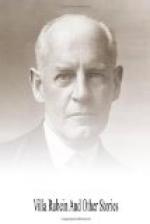A writer they say, should not favouritize among his creations; but then a writer should not do so many things that he does. This writer, certainly, confesses to having favourites, and of his novels so far be likes best: The Forsyte Series; “The Country House”; “Fraternity”; “The Dark Flower”; and “Five Tales”; believing these to be the works which most fully achieve fusion of seer with thing seen, most subtly disclose the individuality of their author, and best reveal such of truth as has been vouchsafed to him. John galsworthy.
TO
MY SISTER BLANCHE LILIAN SAUTER
VILLA RUBEIN
I
Walking along the river wall at Botzen, Edmund Dawney said to Alois Harz: “Would you care to know the family at that pink house, Villa Rubein?”
Harz answered with a smile:
“Perhaps.”
“Come with me then this afternoon.”
They had stopped before an old house with a blind, deserted look, that stood by itself on the wall; Harz pushed the door open.
“Come in, you don’t want breakfast yet. I’m going to paint the river to-day.”
He ran up the bare broad stairs, and Dawney followed leisurely, his thumbs hooked in the armholes of his waistcoat, and his head thrown back.
In the attic which filled the whole top story, Harz had pulled a canvas to the window. He was a young man of middle height, square shouldered, active, with an angular face, high cheek-bones, and a strong, sharp chin. His eyes were piercing and steel-blue, his eyebrows very flexible, nose long and thin with a high bridge; and his dark, unparted hair fitted him like a cap. His clothes looked as if he never gave them a second thought.
This room, which served for studio, bedroom, and sitting-room, was bare and dusty. Below the window the river in spring flood rushed down the valley, a stream, of molten bronze. Harz dodged before the canvas like a fencer finding his distance; Dawney took his seat on a packingcase.
“The snows have gone with a rush this year,” he drawled. “The Talfer comes down brown, the Eisack comes down blue; they flow into the Etsch and make it green; a parable of the Spring for you, my painter.”
Harz mixed his colours.
“I’ve no time for parables,” he said, “no time for anything. If I could be guaranteed to live to ninety-nine, like Titian—he had a chance. Look at that poor fellow who was killed the other day! All that struggle, and then—just at the turn!”
He spoke English with a foreign accent; his voice was rather harsh, but his smile very kindly.
Dawney lit a cigarette.
“You painters,” he said, “are better off than most of us. You can strike out your own line. Now if I choose to treat a case out of the ordinary way and the patient dies, I’m ruined.”




